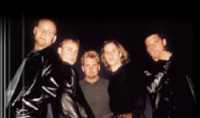Over one million records later and Sister Hazel are still five down-to-earth guys from Gainesville, Florida. When their heartfelt debut ...Somewhere More Familiar was first self-released in 1996, it sold over 10,000 copies in less than three months. When Universal Records re-released the album in the winter of 1997, the catchy love-struck first single "All For You" became one of the most played songs on radio that year. With "All For You" and the success of the group's second single "Happy", the band set out on an endless tour as sales figures climbed. Late in 1998, after clocking in 300 shows a year, Sister Hazel retreated back to their homes for some much deserved R&R. "We really needed to take some time off to regroup, recharge our battery, and write some more songs," declares lead singer/acoustic guitarist Ken Block. "Whenever you come through an experience as intense as we have, you can't come out of that unfazed." Rhythm guitarist Andrew Copeland is just as honest about the sometimes-overwhelming succes
s of the past few years. "I think you're caught up so deep in it, that you don't know what you've done. I didn't really get to sit back and appreciate all the experiences we'd had until we came off the road. Family and friends were big priorities after the tour, but eventually the rock 'n' roll bug came back. Block and Copeland along with bassist Jeff Beres, lead guitarist Ryan Newell, and drummer Mark Trojanowski eagerly reconvened in the spring of 1999 at Rumbo Studios in LA with producer Mike Clink (Guns 'n' Roses). Even though 60 songs had been created, the sessions seemed to be missing a vital element, so Richie Zito (Cheap Trick, Joe Cocker) was commandeered for co-production duties. Things still didn't seem to be clicking to everyone's satisfaction, so the band decided to take a couple of months off to write a few more tunes and get their heads together. "I think when we came out, our writing reflected what we had been going through being in that little bubble that is the rock 'n' roll business when you have success," Block admits. "We were writing a certain kind of song that reflected all of that and what we didn't want was to have a one-dimensional record."
One of those songs was the epic title cut, "Fortress," that finishes out the collection. The emotive six-minute saga tackles the strain of fame and its less publicized darker side. "'Fortress' came at a time when I was really reeling and was just over-stimulated by it all," admits Block. "I needed to regroup and put up my own fortress and my own boundaries and get back to a safe place as a writer and remember what it's like to be human again. It was a really easy song to write and came really quickly at a time when I was very introspective. And it was quite therapeutic."
As it would turn out, Sister Hazel had a lot to say. During the break, half the songs that would make up Fortress were conceived. "There was just a magic that happened during the break," says Andrew. One of these efforts would be the first single, "Change Your Mind." "Sometimes the strangest place I've ever been, and the hardest place I've ever been is in my own mind," philosophizes Block. "I recognize and believe very strongly that our perspective on things and our perception creates our reality. Depending on how we look at something, we can change the way we think about it or how we feel about it. And that's my biggest challenge."
With their minds in the right frame, the band switched coasts and began recording again at Nickel and Dime Studios in Atlanta. Zito stayed behind the board and longtime friend Paul Ebersold (Stevie Ray Vaughan, 3 Doors Down), who produced ...Somewhere More Familiar, came back into the fold. "We put a lot of pressure on ourselves," Copeland remarks frankly. "We were really pushing to please everyone else, but once we took that break and came back, I think we wrote songs that were true to ourselves again, and I think that brought the magic back."
